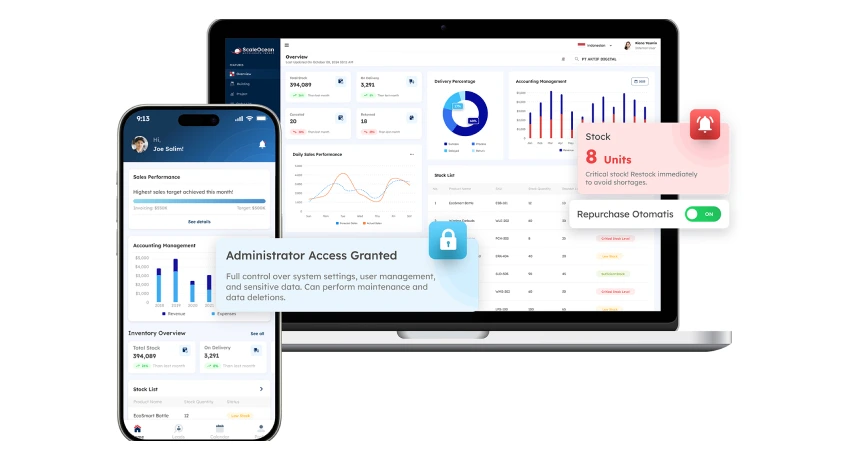ERP consolidation is essential for businesses struggling with fragmented systems that consume significant time and resources, making it difficult to stay competitive. By unifying multiple ERP solutions into a single, integrated platform, companies can eliminate redundant processes, improve data accuracy, and enhance decision-making.
According to EdgeDelta from a Cloud Security Alliance (CSA) report, 63% of enterprises prioritize cloud adoption to improve operational efficiency (CSA, 2022).
This shift is particularly crucial for small and medium-sized enterprises (SMEs), which contribute 48% to Singapore’s GDP and focus 78% of their efforts on enhancing operational efficiency (EDB, 2023).
Through ERP consolidation, businesses can streamline workflows, reduce IT complexity, and gain better visibility into their operations, ultimately driving long-term growth.
- ERP consolidation is the process of integrating multiple ERP systems or modules into a single, unified platform, which significantly enhances business efficiency.
- ERP consolidation has both pros and cons. simplifies operations by merging systems into one platform. However, it can also incur high costs, time, and potential disruptions during the transition.
- ERP consolidation best practices include assessing existing systems, engaging stakeholders, creating a plan, and prioritizing data quality for a smooth transition.
- ScaleOcean ERP offers a solution by accelerating ERP consolidation, enabling businesses to streamline operations and reduce expenses.

What is ERP Consolidation?
ERP consolidation is the process of integrating multiple ERP systems or modules into a single, unified platform, which significantly enhances business efficiency. While 45% of global businesses struggle with fragmented ERP systems (NetSuite), Singaporean logistics companies frequently use three or more platforms to handle global supply chains.
Additionally, legacy systems in manufacturing contribute to operational inefficiencies. By consolidating these systems, companies streamline operations, improve data accuracy, and reduce redundancies. Understanding hybrid ERP systems enables organizations to stay agile and achieve a competitive edge through seamless integration.
Why Businesses End Up Using More Than One ERP System?
It’s common for businesses to use multiple ERPs because their needs often grow faster than their systems can keep up. As teams expand and tasks change, new solutions get added to handle specific jobs without replacing the old ones. Here is why that usually happens:
1. Different ERP solutions adopted for specific operational needs
Companies often pick up new ERP systems when their current ones just can’t keep up with new demands. As teams grow, they often choose specialized tools that fit their unique workflows perfectly.
Over time, these systems stay in place because replacing them is a huge hassle. To avoid stopping daily work, businesses often keep several platforms running at once to stay productive, even if it makes managing data a bit more complex.
2. Business expansion through mergers and acquisitions
New ERP systems often enter the mix when companies join forces. Since each business already has its own setup running daily tasks, trying to unify everything immediately can be risky and very expensive.
To keep things running smoothly, many businesses choose to keep multiple ERPs active for a while. A gradual integration is usually the best bet, as it prevents big disruptions while slowly aligning data and processes across the new organization.
ERP Consolidation’s Pros and Cons
ERP consolidation has both advantages and drawbacks. On the one hand, it simplifies operations by merging multiple systems into a single platform, enhancing efficiency and data accuracy. However, it can also involve high costs, time, and potential disruptions during the transition.
One of the solutions is to leverage the best ERP software in Singapore to ensure seamless integration and better performance. Here are the pros and cons of ERP Consolidation:
1. ERP Consolidation’s Pros
When businesses consolidate their ERP systems, they can enjoy a variety of benefits. This process helps streamline operations, reduce complexity, and increase overall efficiency. By bringing all processes into a single system, companies can make faster decisions and use resources more effectively, which is one of the benefits of cloud ERP.
However, ERP consolidation isn’t just about improving efficiency. It also brings specific advantages that can drive growth. Whether it’s reducing costs, improving compliance, or supporting regional expansion, these benefits help businesses stay competitive. Let’s take a closer look at these advantages:
- Enhance Operational Productivity: One of the most notable benefits of ERP consolidation is the boost to operational productivity. By centralizing all business functions into one platform, companies can automate tasks and simplify workflows, reducing the need for manual work and ultimately driving higher productivity.
- Reduce Expenses & Maximize IT Investment: Consolidating ERP systems can lead to significant cost savings. By integrating various tools into one platform, businesses can cut down on redundancies, optimize their IT spending, and avoid the potential costs of ERP system failures, ultimately leading to a better ROI.
- Maintain Compliance with Singapore’s Regulations: For businesses in Singapore, ERP consolidation plays a crucial role in maintaining regulatory compliance. It makes it easier to manage and report data, ensuring businesses stay up-to-date with local laws and regulations while minimizing the risk of non-compliance.
- Expand to Support Regional Growth: As businesses expand to new regions, ERP consolidation can make the process smoother. With mobile ERP systems, companies can manage operations across multiple locations with ease, supporting regional growth and adapting to new market demands.
- Improve Data Accuracy and Decision-Making: Consolidating ERP systems improves data accuracy by centralizing information in one place. This creates a single, reliable source of truth, making it easier for decision-makers to base their strategies on accurate, up-to-date data.
- Streamlined Auditing: A consolidated ERP system simplifies the auditing process. With all financial and operational data in one place, businesses can generate accurate reports, track compliance, and reduce the time and effort required for manual audits.
- Enhanced User Experience: By consolidating ERP systems, businesses can improve the user experience. Employees no longer need to juggle multiple platforms, as everything is available in a single, easy-to-navigate interface. This reduces complexity and improves collaboration across teams.
- Greater Operational Efficiency: ERP consolidation helps businesses eliminate redundancies and simplify workflows. With one system managing multiple functions, companies can save time and effort, ultimately leading to higher efficiency and allowing teams to focus on what truly matters.
- Strengthened Risk Management: With a unified ERP system, risk management becomes more effective. By consolidating data, businesses can monitor and control operations more closely, allowing them to identify potential risks early and take action to mitigate them before they become major issues.
2. ERP Consolidation’s Cons
While ERP consolidation offers numerous benefits, it also comes with its share of drawbacks. The process can be complex and costly, requiring significant time, effort, and resources. It’s important to consider these potential downsides before deciding to consolidate.
Additionally, while ERP consolidation can drive efficiency, it may also introduce some risks. Data integrity issues, increased time commitments, and the difficulty of finding a solution that fits all needs can present obstacles. Let’s dive deeper into these cons:
- Potential Gaps in Data Integrity: A potential downside of ERP consolidation is the risk of data integrity issues. When merging multiple systems, data from different sources may not align perfectly, leading to discrepancies. It’s crucial to address these issues to ensure accurate, reliable reporting.
- Time and Resource Demands: Consolidating ERP systems requires significant time and resources. It involves assessing current systems, planning the integration process, and dedicating staff and budgets to the transition. The time and resource demands can be a challenge for businesses already operating at full capacity.
- Challenges in Finding a One-Size-Fits-All Solution: Another challenge of ERP consolidation is the difficulty of finding a solution that meets every department’s needs. Different business units often have specific requirements, and a single ERP system may not always be flexible enough to accommodate them all.
Merging ERPs brings great perks like lower costs, but it can also be a bit of a headache with data and timing. To help you through it, ScaleOcean’s ERP solution offers smooth integration and custom support, making the whole process much easier for your business.

Challenges of ERP Consolidation and How to Overcome Them
ERP consolidation can be complex, requiring careful planning and execution. Businesses may face challenges like system integration, data migration, and user adoption. However, with the right strategies, these obstacles can be managed effectively. Here are some common challenges and ways to address them:
1. Significant Upfront Expenses
SMEs Go Digital grants can cover up to 80% of ERP costs, easing consolidation for smaller firms. By leveraging this support and the benefits of ERP finance modules, businesses improve cash flow control without heavily straining budgets.
2. Staff Resistance
Use Leverage SkillsFuture programs to upskill employees and ensure a smooth transition to the new ERP system. These training programs equip employees with the necessary skills to adapt quickly, reducing resistance to change.
Investing in employee development fosters a culture of continuous learning, improving overall efficiency, and maximizing the benefits of ERP implementation. With SaaS ERP software, employees can access real-time data and collaborate more effectively, further enhancing system adoption and success.
3. Integration with Legacy Systems
For example, a local manufacturer successfully integrated IoT-enabled machines with their newly implemented ERP system, proving that even legacy systems can be seamlessly incorporated with the right approach.
This integration enabled real-time data tracking, improved production efficiency, and enhanced decision-making. Choosing the best enterprise software ensures businesses can modernize operations while leveraging existing infrastructure, leading to smoother transitions and better outcomes.
4. Data Migration Challenges
According to Corning Data, 40% of ERP projects fail due to poor data quality. To prevent this, businesses should prioritize data cleansing before migration, ensuring accuracy and consistency.
Implementing a phased migration approach allows for a gradual transition, minimizing disruptions and ensuring a smooth ERP consolidation. Additionally, considering custom and off-the-shelf ERP scalability helps businesses tailor data migration strategies to their needs, ensuring a seamless transition.
Best Practices for Smooth and Successful ERP Consolidation
ERP consolidation can greatly enhance a company’s efficiency, but to achieve this, the process must be carefully planned and executed. Implementing best practices ensures a smooth transition, reduces disruptions, and maximizes the benefits of the new system.
To achieve a seamless ERP consolidation, businesses should follow a strategic approach. The following best practices will guide you through the critical steps for a smooth and successful ERP consolidation:
1. Comprehensive Assessment of Existing Systems and Workflows
Before jumping into consolidation, it’s a good idea to take a close look at your current ERP setup. This helps you spot where things are slowing down or overlapping, so you can plan for improvements and avoid any messy pitfalls along the way.
By getting to know the pros and cons of your current systems, you can decide what to keep or change. This evaluation really sets the stage for a smoother transition, making sure your new, streamlined setup is as efficient as possible.
2. Early Engagement with Key Stakeholders
Getting your key people involved early in the ERP merge is a must. It keeps every department on the same page, giving everyone a chance to share their thoughts and help plan. This build-up of support is what makes the whole rollout go much smoother.
When you bring stakeholders in from day one, you naturally reduce pushback. By listening to their ideas and addressing worries early, the transition feels more like a team effort, making it way easier for everyone to get on board with the new system.
3. Create a Plan and Set a Date
You need a clear plan and a firm date to get your ERP consolidation moving. Outlining your milestones and resources early on keeps the team focused, while having a deadline creates the momentum needed for a smooth transition.
A good plan also helps everyone know what to expect. By breaking the work into phases, you can avoid that stressful last-minute rush and catch any issues early. This keeps the whole process organized and sets you up for a much more successful result.
4. Prioritizing Data Quality and Data Cleansing
Good data is a must when merging ERPs. By cleaning your data first, you make sure only accurate info moves to the new system. This helps you avoid errors and duplicates that could mess up your daily work later on.
A good cleanup means checking and fixing your data before the big move. By tidying things up now, you ensure your new ERP is full of reliable info, which leads to much better insights and a smoother experience for everyone after the systems combine.
5. Phased Migration Approach to Minimize Disruptions
Moving your ERP in phases is a total lifesaver for a smooth transition. Instead of rushing it all at once, shifting in stages helps you catch any hiccups early and keeps your daily work from hitting a wall.
By breaking the move into smaller chunks, your team can test and tweak things as they go. This lowers the risk of big errors and lets you fine-tune every process before the final switch, ensuring your business stays up and running the whole time.
6. Employee Training and Change Management Strategies
Getting your team up to speed is key to a smooth ERP merger. Great training helps everyone feel confident with the new tools, which cuts down on pushback and makes sure everyone actually enjoys using the system.
A solid plan focuses on clear talk and plenty of support to settle any worries. By keeping everyone in the loop and offering a helping hand, businesses can make the switch much easier, boosting both productivity and long-term success with the new ERP.
7. Continuous Monitoring and Evaluation
Once your ERP merger starts, keeping a close eye on it is key. Checking performance in real-time helps you catch any little glitches or slow spots before they become big headaches. It’s the best way to keep the whole transition on the right track.
Checking in on your new setup regularly ensures it still fits your goals. You can tweak things as you go, or even try implementing a two-tier ERP strategy if needed. This keeps your system flexible and balanced, so it’s always ready for whatever comes next.
How to Accelerate ERP Consolidation with ScaleOcean
Managing multiple ERP systems can be challenging, often resulting in inefficiencies and higher operational costs. These inefficiencies directly impact the Cost to Company (CTC) by increasing IT maintenance expenses, requiring additional resources, and reducing overall productivity.
ScaleOcean offers a solution by accelerating ERP consolidation, enabling businesses to streamline operations and reduce expenses. By integrating multiple systems into a unified platform, ScaleOcean simplifies management while enhancing compliance, operational flexibility, and overall efficiency.
This not only optimizes resource allocation but also helps businesses control overhead costs and improve financial predictability. Experience the benefits firsthand with a free demo and see how ScaleOcean can transform your business operations through the following key features.
Key Features:
- Pre-built compliance with GST, PDPA, and IRAS requirements: ScaleOcean ensures your business is compliant with key regulatory standards, minimizing risk and ensuring smooth operations.
- Cloud-based flexibility for hybrid work environments: The cloud-based platform allows teams to access the system from anywhere, fostering collaboration and boosting productivity in a hybrid setting.
- Multi-language support for regional teams: With language options tailored to the region, ScaleOcean accommodates diverse teams, ensuring smooth communication and user experience.
Moreover, a logistics company in Singapore shared, “ScaleOcean helped us consolidate 4 ERPs into one, cutting costs by 25%”. This success story demonstrates ScaleOcean’s transformative impact, optimizing ERP systems and driving significant cost savings.
By streamlining operations into a unified platform, the company achieved smoother workflow management, enhanced efficiency, and improved resource utilization, ultimately contributing to better overall performance.
Conclusion
ERP consolidation is a strategic move for businesses, especially SMEs in Singapore, seeking greater efficiency, productivity, and cost savings. By integrating fragmented systems into a single platform, companies can streamline operations, eliminate redundancies, and enhance data accuracy.
Government initiatives like SMEs Go Digital provide subsidies to support ERP adoption, making modernization more accessible. As businesses grow, a unified ERP system ensures agility, regulatory compliance, and readiness for regional expansion.
ScaleOcean simplifies ERP consolidation with its cloud-based platform, pre-built compliance features, and multi-language support. Businesses can seamlessly integrate their systems while benefiting from real-time assistance from a local support team.
With a flexible and cost-effective pricing structure, ScaleOcean ERP makes scaling operations more affordable. For a hands-on experience, try the free demo and discover how ScaleOcean’s ERP system can optimize your business processes and drive long-term success.
FAQ:
1. How to migrate from one ERP to another?
1. Build a business case, defining clear objectives for the migration.
2. Prepare your data by cleaning and structuring it for migration.
3. Choose an ERP system that fits your business needs.
4. Collaborate with ERP experts to guide the process.
5. Customize the new system according to your processes.
6. Train employees to ensure smooth system adoption.
7. Run tests to identify potential issues before full deployment.
8. Implement a collaborative rollout involving all stakeholders.
2. What are the three methods of consolidation?
The three primary consolidation methods are full consolidation, where all subsidiary data is integrated, like proportional consolidation, which reflects shared ownership, and the equity method, where investment shares are recorded.
3. What are the three stages of consolidation?
1. Gather and standardize financial data.
2. Apply necessary consolidation adjustments and merge data.
3. Generate the final consolidated financial reports.
4. What are the two types of consolidation?
In US GAAP, there are two main consolidation models like the variable interest entity (VIE) and voting interest entity (VOE) models. A reporting entity with a variable interest in a legal entity, not exempt from scope exceptions, must first assess if the VIE model is applicable.












 PTE LTD..png)
.png)

.png)








.png)
.png)
















